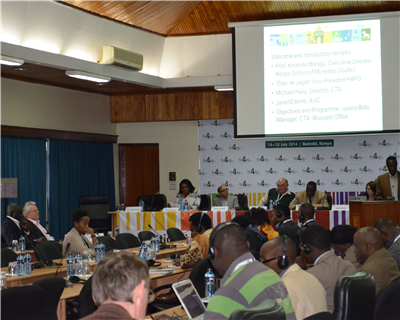African Continental Briefing: Building trust and private-sector empowerment is key
At the 2nd African Continental Briefing at the Fin4Ag conference in Nairobi, participants discussed how to strengthen value chains, build trust and help the public sector empower private players to finance farmers.

Agriculture has the potential to transform African economies, but only after major investment. How to strengthen value chains, build trust and help the public sector empower private players to finance farmers were just some of the themes discussed during the 2nd African Continental Briefing at the Fin4Ag conference in Nairobi.
Agriculture critical for Africa
“Sustained agricultural growth is crucial” for Africa, economically and socially, according to Janet Edeme, policy officer at the African Union. The need for more agri investment has therefore become “one of the most important issues of our day”.
To feed a projected global population of 9 billion by 2050, food production needs to almost double, she told delegates in an opening session. To achieve this, the world needs to invest an extra $83bn per year in developing countries’ agriculture sectors.
Despite Africa’s massive share of global arable land, around half the food consumed in African cities is imported, noted Lamon Rutten, manager, policies, markets and ICTs at the Technical Centre for Agricultural and Rural Cooperation ACP-EU (CTA). This creates a great opportunity for African farmers to fill that gap by feeding the continent themselves.
“Only through agriculture can we achieve inclusive growth,” says CTA director Michael Hailu. Without transforming smallholder farming, it will be impossible to achieve economic transformation in Africa.
Public and private sector engagement
One challenge agriculture faces is finding the best way for governments and the development sector to engage with private players, Hailu adds.
Although donor and social funding can be useful as a “catalyst” for agriculture development, it is unsustainable in the long term, says David Ruchiu, Africa director for Farm Concern International.
Concerns remain that the private sector exploits farmers and that the public sector is inefficient, but these fears need to be overcome, says Edeme. Governments often have strong political as well as economic reasons for supporting agriculture, and play a vital role as key stakeholders, she adds.
And at the same time, “unless you work with the serious private sector, the chances of taking [agriculture] to scale are very small,” notes Fadel Ndiame, lead coordinator of the Farmer Organisation Support Centre in Africa (FOSCA) at AGRA.
Agriculture is of “fundamental concern” to central banks, according to Professor Kinandu Muragu, executive director at the Kenya School of Monetary Studies, which is hosting the Fin4Ag conference The sector’s ability to attract finance is an important factor in price stability and inflation, he explains.
The history of governments’ involvement in African agrifinance has however been mixed. Government initiatives that subsidise lending rates have mostly “failed miserably,” says Rutten. And farmers should be careful not to reinforce that image by asking for more of the same. Otherwise, they risk “chasing banks away,” he says.
Where governments do have a clear role is in building infrastructure that attracts private players, according to Abraham Sarfo, project coordinator at NEPAS’s Comprehensive Africa Agricultural Development Program (CAADP). The public sector needs to create an “enabling environment” for the private sector, empowering business by, for example, facilitating training, providing access to land and inputs, and creating a supportive regulatory regime.
Governments also have a responsibility not only to attract foreign investors but to enable domestic investors to take advantage of opportunities in agriculture, he adds.
Strong need to strengthen value chain
Value chains need more finance earlier on in the agriculture process, notes Theo de Jager, vice president of the South African Confederation of Agricultural Unions (SACAU). “The chain starts prior to planting, and that’s where the financing fits in.”
Farmers and financiers have to accept however that value chains are not simple supply chains – they involve a mutual relationship, says Rutten. If farmers break a commitment, for example by side-selling produce, it threatens their ability to access input finance next time.
Trust is indeed a key issue in agrifinance, and this can only be achieved by regular dialogue between all players along the value chain, according to Ousseini Oudraogo at the Agricultural Producers’ Organisations of West Africa (ROPPA). He cites Mogtedo in Burkina Faso as an example of a farmers’ cooperative that has managed to build trust with a microfinance institution through negotiation.
Products tailor-made for the sector
More understanding of how farmers and cooperatives operate also means that financiers can provide products that are specifically designed for the sector.
“You can’t get agri off the ground with the normal products you’d find at the bank,” says de Jager. “You need something tailor-made, designed for agriculture,” and specifically something that replaces land as collateral.
Encouraging input providers to risk-share on farmer financings is one solution offered by SACAU, which this year rolled out its first pilot project in Tanzania. The project clusters together nearly 70 farmers who are financed by ABSA with commodities trader Bunge as offtaker. While that offtake agreement acts as quasi-collateral, input providers, SACAU and the bank also evenly shared the risk of 30% of the crop value. This is distinct to many such financings, where the producer and the bank are disproportionately exposed compared with other players in the value chain.
Pooling resources
To achieve the critical mass needed to attract finance, farmers also need to organise themselves better in collectives and farmer associations.
Farmers are only “big enough to be bankable” when resources are pooled, notes de Jager.
Farm Concern International, for example, organises smallholders into ‘commercial villages’ of around 300 households. Private sector players find it a “headache” to work with individual smallholders, but working collectively they can negotiate a better deal, says Ruchiu.





